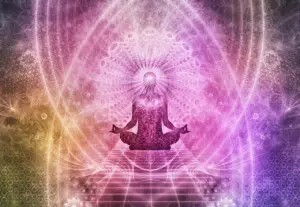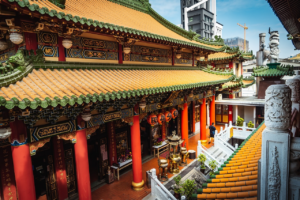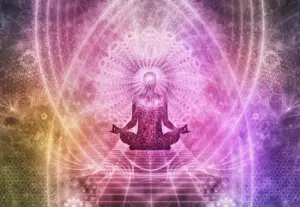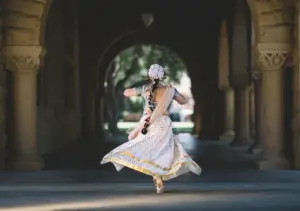Are you fascinated by the rich and diverse religious landscape of Taiwan? If so, you may be interested in exploring the unique rituals and traditions that are practiced across different religions.
From Taoism to Christianity, the people of Taiwan celebrate a variety of spiritual beliefs, each with their own set of customs and practices.
Whether you are a local resident or a curious traveler, understanding how these different religions coexist and interact with one another can provide a deeper appreciation for the culture and history of Taiwan.
In this article, we’ll take a closer look at the rituals and traditions of Taoism, Buddhism, Confucianism, and Christianity, and compare and contrast how these practices vary across different religions.
Join us on a journey through Taiwan’s religious landscape and discover the significance of these rituals and traditions in the daily lives of its people.
Key Takeaways
- Taiwan has a rich tapestry of religions, including Buddhism, Taoism, Confucianism, Christianity, Islam, and Hinduism.
- Rituals and traditions are significant in Taiwanese culture, with festivals and celebrations such as Lunar New Year, Ghost Month, and Mid-Autumn Festival being common.
- Ancestor worship and divination are common across Buddhism, Taoism, and Confucianism, with each religion also having its unique practices and beliefs.
- Understanding the differences and similarities between religions can provide a deeper appreciation of Taiwanese culture, and exploring rituals and traditions can provide a meaningful and immersive experience.
Overview of Taiwan’s Religious Landscape
You’re probably wondering what Taiwan’s religious landscape looks like, so here’s a brief overview for you.
Taiwan is home to a diverse range of religions, with the most popular being Buddhism, Taoism, and Confucianism. Christianity, Islam, and Hinduism are also practiced in Taiwan, but to a lesser extent.
Buddhism is the largest religion in Taiwan, with over 10 million followers. It arrived in Taiwan during the 4th century and was brought by Chinese immigrants.
Taoism, on the other hand, is a traditional Chinese religion that emphasizes living in harmony with nature and the universe.
Confucianism, while not a religion, is a philosophical and ethical system that has had a significant influence on Taiwanese culture and society.
The unique blend of these religions and their respective traditions has created a rich tapestry of customs and practices in Taiwan.
Taoism
When visiting a Taoist temple in Taiwan, it feels as if you’re stepping into a mystical world filled with incense smoke, colorful statues, and the soft hum of chanting.
Taoism is one of the major religions in Taiwan, and it has a unique set of rituals and traditions that are practiced in its temples.
One of the most important practices in Taoism is the offering of incense, which is believed to connect the worshipper with the divine.
In addition to incense offerings, Taoist temples in Taiwan also have elaborate rituals for celebrating important occasions such as the Lunar New Year and the birthday of the Jade Emperor.
During these rituals, worshippers perform dances and burn paper offerings to show their respect for the gods.
Taoism also has a rich tradition of divination, with many temples offering services such as fortune telling and dream interpretation.
Overall, Taoism is a fascinating religion with a rich history and unique traditions that are an important part of Taiwan’s religious landscape.
Buddhism
When it comes to Buddhism, you may find it fascinating to explore their beliefs and practices.
Buddhism centers around the idea of achieving enlightenment and understanding the true nature of reality. Along with daily meditation and mindfulness practices, Buddhists also engage in various rituals and ceremonies to deepen their spiritual connection.
Additionally, there are many important festivals and celebrations in Buddhism, such as Vesak or Buddha’s Birthday, that offer unique cultural experiences and insights into the religion’s traditions.
Beliefs and Practices
One of the most fascinating aspects of Taiwanese culture is how beliefs and practices differ across various religions.
In Buddhism, the primary belief is in reincarnation, and the ultimate goal is to achieve enlightenment and escape the cycle of rebirth. To achieve this, Buddhists focus on the Four Noble Truths and the Eightfold Path, which emphasize mindfulness, meditation, and ethical behavior.
Buddhists also engage in various practices, such as chanting, offering food to monks, and visiting temples to make offerings and pray. They also celebrate important events, such as Vesak Day, which commemorates the birth, enlightenment, and death of the Buddha.
During Vesak Day, Buddhists often participate in parades and ceremonies, light lanterns, and give to charity. Overall, Buddhism in Taiwan is characterized by a strong emphasis on self-discipline, compassion, and community.
Festivals and Celebrations
Taiwanese culture is imbued with a rich tapestry of festivals and celebrations, each with its unique customs and traditions. Whether you’re a Buddhist, Taoist, or Christian, there are plenty of occasions to celebrate and participate in.
Here are some of the most popular festivals and celebrations in Taiwan:
-
Lunar New Year: This is the most important festival in Taiwan, and it’s celebrated by everyone. People clean their houses to sweep away bad luck and decorate them with red banners and lanterns. They also prepare special foods, such as dumplings and rice cakes, and offer them to their ancestors and deities.
-
Ghost Month: This is a month-long festival in which people pay homage to their ancestors and the spirits of the dead. They burn incense, joss paper, and other offerings to appease the spirits and ensure their own good fortune. There are also many theatrical performances and other cultural events during this time.
-
Mid-Autumn Festival: This festival is also known as the Moon Festival, and it’s celebrated with mooncakes, lanterns, and other traditional foods. People also gather to admire the full moon and perform dragon and lion dances. It’s a time for family reunions and expressing gratitude for a bountiful harvest.
Confucianism
Confucianism’s influence on Taiwanese culture can be seen in the emphasis on education and respect for authority figures. Confucianism is a philosophy that focuses on the importance of education, moral values, and social order. In Taiwan, Confucianism has played a significant role in shaping the country’s culture and traditions.
One of the most prominent ways in which Confucianism has influenced Taiwanese culture is through its emphasis on education. Education is highly valued in Taiwan, and parents often make great sacrifices to ensure that their children receive a good education. Confucianism also emphasizes the importance of respect for authority figures, such as parents, teachers, and government officials. This respect for authority is reflected in Taiwanese culture, where people are expected to show deference and obedience to those in positions of authority.
To further illustrate the impact of Confucianism on Taiwanese culture, the following table compares some of the key beliefs and practices of Confucianism with those of other major religions in Taiwan.
| Beliefs/Practices | Confucianism | Buddhism | Taoism |
|---|---|---|---|
| Ultimate goal | Moral perfection | Enlightenment | Union with the Tao |
| Concept of deity | No specific deity | Buddha, Bodhisattvas | Immortals, deities |
| View of afterlife | No specific belief | Reincarnation | Reincarnation |
| Rituals | Ancestor worship, filial piety | Meditation, chanting | Feng shui, divination |
As you can see, Confucianism places a strong emphasis on moral values and social order, while Buddhism and Taoism focus more on spiritual enlightenment and the afterlife. However, all three religions share a common emphasis on ritual practices, such as ancestor worship and divination. Understanding the differences and similarities between these religions can help us appreciate the diversity of Taiwanese culture and the various ways in which religious beliefs and practices have influenced it.
Christianity
Now that you’ve learned about Confucianism’s rituals and traditions in Taiwan, let’s shift our focus to Christianity.
Although Christianity isn’t a traditional religion in Taiwan, it’s been growing rapidly since the arrival of Western missionaries in the 16th century. Today, it’s the third largest religion in Taiwan with over 600,000 believers.
Christianity’s rituals and traditions in Taiwan are similar to those in other parts of the world. Christians attend church services on Sundays and hold important celebrations such as Christmas and Easter.
However, some unique practices have developed in Taiwan, such as the celebration of the ‘Ghost Festival’ in some Christian communities. This festival is a traditional Taiwanese festival held in honor of ancestors and the deceased.
Overall, Christianity in Taiwan has adapted to local customs and traditions while still maintaining its core beliefs and practices.
Comparing and Contrasting Rituals and Traditions
As you explore the practices of Christianity in Taiwan, you can see how they differ from those you may be familiar with.
For instance, the Catholic Church in Taiwan has incorporated some local customs into their practices. During Holy Week, Catholics in Taiwan may participate in a procession that includes a small statue of the Virgin Mary that is carried through the streets. This procession may also include lion dancers and dragon dancers, which are traditional Taiwanese performances.
On the other hand, Protestant churches in Taiwan may have a more modern approach to their practices. For example, some churches may have a contemporary worship service that includes live music, while others may incorporate technology such as projectors and screens to display lyrics and images.
Despite these differences, both Catholic and Protestant churches in Taiwan share common elements with their counterparts around the world, such as prayer, Bible study, and baptism.
The Significance of Taiwanese Rituals and Traditions
You may be interested to know that Taiwanese rituals and traditions hold great significance in the country’s history and culture. These practices have been passed down from generation to generation and have become an essential part of Taiwanese identity.
Additionally, these rituals and traditions have had a profound impact on Taiwanese society, shaping its values, beliefs, and way of life.
Connection to History and Culture
Exploring the rich history and culture of Taiwan through the lens of various religious rituals and traditions allows for a deeper understanding and appreciation of the country’s diverse heritage. Whether you’re a local or a traveler, learning about the connections between these rituals and the historical and cultural context in which they developed can provide a meaningful and immersive experience.
Here are three examples of how Taiwanese rituals and traditions are intertwined with the country’s history and culture:
-
The annual Ghost Festival, also known as Zhong Yuan Jie, is a Taoist and Buddhist celebration that dates back to the Tang Dynasty. It’s believed that during this time, the spirits of the dead return to the living world, and so people offer food and incense to appease them. This ritual reflects the importance of ancestor worship and filial piety in Taiwanese culture.
-
The Mazu Pilgrimage is a Taoist tradition that honors the sea goddess Mazu, who’s believed to protect fishermen and sailors. This pilgrimage, which involves carrying a statue of Mazu on a journey around Taiwan, has been a part of Taiwanese culture for over 300 years. It not only showcases the country’s maritime heritage but also highlights the important role that religion plays in the daily lives of many Taiwanese people.
-
The Lunar New Year, also known as Spring Festival, is celebrated by many Taiwanese people regardless of their religion. This holiday is deeply rooted in Chinese culture and tradition, with customs such as cleaning the house before New Year’s Day and giving red envelopes filled with money to children. The Lunar New Year reflects the importance of family and community in Taiwanese culture and provides a time for people to come together and celebrate their shared heritage.
Impact on Taiwanese Society
The impact of these cultural practices on Taiwanese society is evident in the way they shape and influence daily life. From the way families gather and celebrate important occasions to the respect shown towards elders and ancestors, these rituals and traditions have become an integral part of Taiwanese culture. Furthermore, they have also helped to foster a sense of community and belonging among the Taiwanese people, serving as a way to maintain cultural identity and heritage.
To better understand the impact of these cultural practices, a table comparing some of the major rituals and traditions across different religions in Taiwan can be helpful. The following table provides a brief overview of some of the key practices and beliefs held by practitioners of Buddhism, Taoism, and Confucianism in Taiwan. While each religion has its own unique set of rituals and beliefs, they all contribute to the rich tapestry that is Taiwanese culture and society.
| Religion | Major Rituals | Key Beliefs | ||||
|---|---|---|---|---|---|---|
| Buddhism | Offering of incense, chanting of sutras, vegetarianism | The Four Noble Truths, Eightfold Path, karma and rebirth | ||||
| Taoism | Offering of incense, divination, Feng Shui | Tao, Yin and Yang, Five Elements | ||||
| Confucianism | Ancestral worship, respecting elders, education | Filial piety, ethics, social harmony | Shintoism | Shrine visits, purification rituals, reverence for nature | Kami (spirits), respect for ancestors, gratitude for blessings |
Frequently Asked Questions
How do Taiwanese rituals and traditions compare to those in other Asian countries?
When it comes to comparing Taiwanese rituals and traditions to those in other Asian countries, there are certainly some similarities and differences to consider.
For example, many Asian countries place a strong emphasis on family and ancestral worship, which is also true in Taiwan. However, the specific customs and practices associated with these rituals may vary from country to country.
Additionally, Taiwan has a unique blend of cultural influences, including Chinese, Japanese, and indigenous traditions, which sets it apart from other Asian countries.
Overall, while there may be some similarities between Taiwanese rituals and those in other Asian countries, it’s important to consider the specific cultural and religious contexts in each place.
What are some unique rituals or traditions specific to certain regions within Taiwan?
If you’re curious about unique rituals or traditions specific to certain regions within Taiwan, you’ll be fascinated to learn about the Mazu Pilgrimage. This ritual is dedicated to the goddess Mazu, who is the patron saint of seafarers and fishermen. It takes place every year in various cities and towns across Taiwan, including Keelung, Dajia, and Beigang.
During the pilgrimage, a statue of Mazu is carried on a palanquin through the streets, and thousands of pilgrims follow along, often dressed in traditional clothing and waving incense sticks. It’s a colorful and lively event, and it’s a great way to experience Taiwan’s rich cultural heritage.
How have Taiwanese rituals and traditions evolved over time?
Over time, Taiwanese rituals and traditions have undergone significant changes. You can observe this evolution in the way people celebrate traditional festivals and hold religious practices.
For instance, the way people celebrate Lunar New Year has changed drastically from the past. In the past, houses were decorated with red lanterns and couplets, and people would perform lion dances and set off firecrackers to scare away evil spirits. Nowadays, people still follow these traditions, but they also incorporate new customs like exchanging red envelopes filled with money and eating hot pot with family and friends.
Similarly, religious practices have also evolved, with some temples incorporating modern technology into their ceremonies and attracting younger generations to participate. These changes reflect Taiwan’s diverse cultural influences and the changing attitudes of its people towards tradition and modernization.
Are there any controversial or debated aspects of certain Taiwanese rituals or traditions?
Have you ever wondered if certain Taiwanese rituals or traditions are controversial or debated? Well, the answer is yes.
For example, the practice of burning paper money and offerings for the dead has been a source of controversy for some time. Some argue that it’s a waste of resources and harmful to the environment, while others believe it’s an important way to honor and provide for ancestors.
Additionally, the use of animal sacrifice in certain religious ceremonies has also been debated, with some calling for an end to the practice. However, others argue that it’s an important part of their religious beliefs and should be respected.
These debates and controversies highlight the complexity and diversity of Taiwanese rituals and traditions.
How do younger generations in Taiwan view and participate in these traditional rituals and traditions?
When it comes to traditional rituals and traditions in Taiwan, younger generations have varied views and levels of participation. Some may see them as important cultural practices that should be preserved, while others may view them as outdated or irrelevant to their modern lifestyles.
However, even those who may not fully participate in these traditions still hold a respect for them and may observe them in some way. It’s important to note that these attitudes may differ depending on the specific tradition and religion in question.
Conclusion
So, you’ve learned about the various religions that are present in Taiwan and the different rituals and traditions that are associated with them.
From Taoism to Christianity, each religion has its own unique set of practices that are followed by its followers. While there are some similarities between certain rituals and traditions, there are also stark differences that set them apart.
Despite these differences, one thing is clear – rituals and traditions play a significant role in Taiwanese culture. They serve as a way for people to connect with their spirituality, honor their ancestors, and bring good luck and fortune into their lives.
Whether you’re a believer or not, it’s hard to deny the impact that these rituals and traditions have on the people of Taiwan.
So next time you find yourself in Taiwan, take some time to observe these practices and learn more about the fascinating religious landscape of this beautiful country.














































































